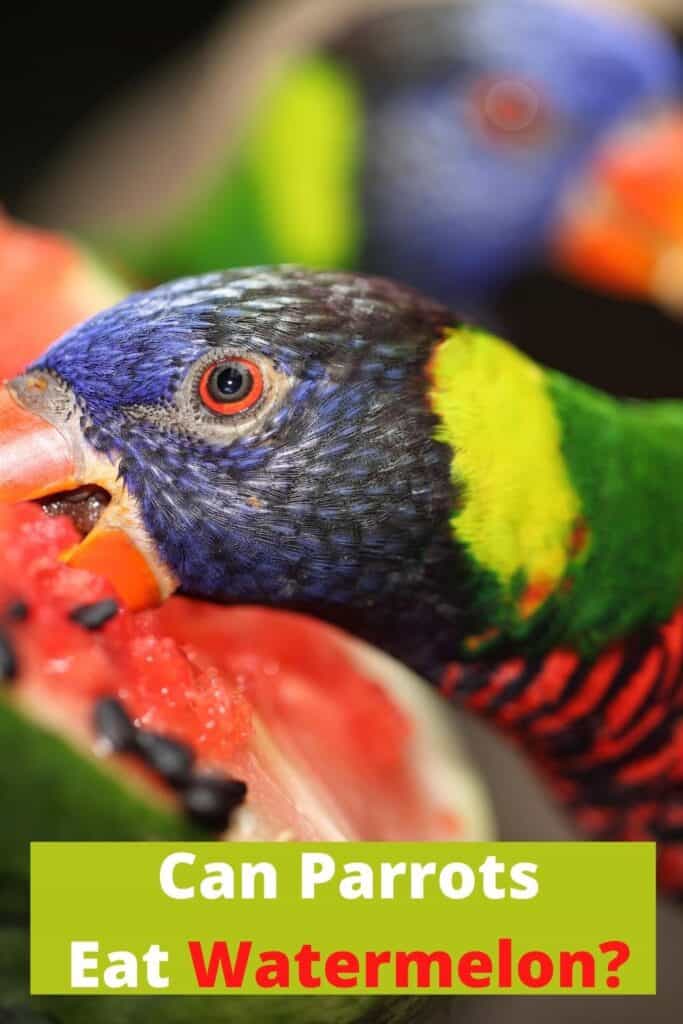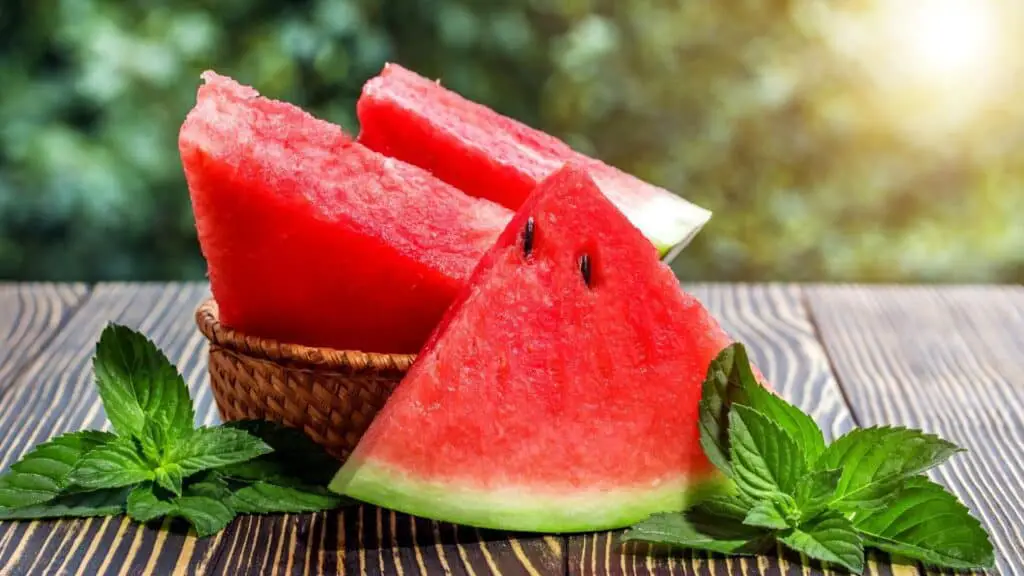Do you know that close to 30% of your pet parrot’s daily diet should consist of vegetables and fruits? The parrot is an omnivore that feasts on both vegetation and meat in the wild. A large portion of their diet comes from fruit, nuts, flowers, seeds, insects, and buds.
The pet parrot’s diet should be as colorful as the wild bird’s diet and watermelon is just one food source you should give them along with many other fruits. Leafy greens, red and yellow fruits, and vegetables are some of the most nutritive foods you can feed your parrot.
With parrots, the larger the chunk of food, the more fun it will have feeding on it. Since parrots treat the act of devouring large chunks of fruit as entertainment and enrichment, they will love feasting on watermelon.
This iconic summer fruit is as colorful and as interesting as the parrot with its striped green exterior, bright pink rind and dark seeds that speckle its sweet and watery interior.

Table of Contents
Parrots can eat watermelon
Parrots eat and love watermelon. It is not only delicious but has minerals and vitamins vital for the colorful bird’s health and function. The watermelon comes from the Cucurbitaceae family, which gives it a green and fruity nature with cucumber notes.
The fruit native to Africa is 92% water and was once used as a nifty source of hydration for travelers. The delicious, juicy fruit is not only a low-calorie snack but has a carotenoid pigment known as lycopene.
Lycopene gives the watermelon its characteristic pink coloration. This carotenoid pigment is also found in healthy fruits such as pink grapefruit, tomatoes, and rosehips. Lycopene has a ton of health benefits for you and your avian friend.
While watermelon is mostly made of water, it has more lycopene than tomatoes do. One of the most important benefits of lycopene is antioxidant support to the skin.
Eating lycopene-rich fruits ensures that the skin can withstand the effects of sunlight and radiation. Its antioxidant effect is also good for the cardiovascular system, lungs, and eyes. Other nutritional benefits of watermelon to parrots include;
- An ample supply of fiber that aids in digestive tract function
- Amino Acid L-citrulline that prevents soreness and muscle aches. It also helps with muscle development.
- An ample supply of vitamin C for skin health and immunity boost
- Choline that reduces inflammation and maintains cellular structure memory. This nutrient also helps in muscle development and movement.
- Vitamin A for feather maintenance and regeneration processes
- Potassium for blood pressure control and heart health
- Magnesium for the development of brain neurons, bones, and healthy feathers. This mineral also enhances muscle coordination and heart health.
- Iron for the hemoglobin production
Should parrots eat watermelon seeds?
Seeds are a parrot favorite. These beautiful birds have a firm jaw that can pry open most nutshells and fruits to get to the seed and pulp within. In captivity, feed your parrot veggies and fruits daily to ensure that they have enough healthy minerals, vitamins, and carbohydrates.
If you give them watermelon for a snack, they will go for the seeds first. They will use their beak to toss out the dark sees from the pink pulp, sprinkling fruit all around.
You should consider cutting your watermelon to small pieces before feeding it to your feathered friend because parrots are in general super messy eaters. Unlike domesticated animals like cats and dogs, parrots love to play with their food.
They will fling half-eaten large chunks of fruit all over the cage as they do in the wild. It is nature’s way of ensuring that parrots play their role as seed dispersers in the forests.
Consequently, give your pet bird watermelon chunks away from walls, carpets, and other household surfaces difficult to clean. Some pet owners will remove the seed from the fruit and soak it overnight to soften it for the bird’s beak.
This pre-preparation of watermelon seeds can lower the chances of accidentally choking on the naturally hard seeds. Nevertheless, if there is any seed left in the fruit, allow the bird to feed on it as it is an excellent source of magnesium, copper, folate, zinc, and potassium.
These minerals are beneficial to the bird, fostering bone, feather, and heart health and its metabolism as well.
Should they consume the watermelon rind?
The organically grown watermelon rind is a superb source of the citrulline, an amino acid that reduces muscle fatigue. It is also good for heart health, reduces blood pressure, and increases energy.
The green rind is also a wonderful source of fiber, good for better bowel movements, and maintenance of healthy weight. If your watermelon is not organically grown, do not feed it to your colorful bird.
It will be full of pesticides that will harm his or her health. The rinds also will have a waxy coating used to preserve it during transportation. Washing the exterior of the fruit might get rid of some of these pests’ repellant, but not all of them.
You should thus only give your bird the flesh and seeds only if the fruits are not organically grown.

How about watermelon juice?
Watermelon juice is also very good for your parrot. Simply blend a little watermelon and serve it to your little bird. Birds, however, poop frequently since their digestive systems are fast acting. As an illustration, a macaw can make an average of 20 stools in a day.
The consistency of your bird’s poop is determined by its diet, so too much watermelon juice will translate to super messy water stools. Give your bird watermelon juice and fruit with moderation.
Macaws can do with a cup and a half of fruit and vegetables per day, while parakeets only need 3/4 of a cup.
Conclusion
Every part of an organically grown watermelon fruit is safe for parrots. Do not overfeed your parrots on watermelon. Your pretty bird needs a balanced mix of fruit of vegetables, seeds, and fruit.




